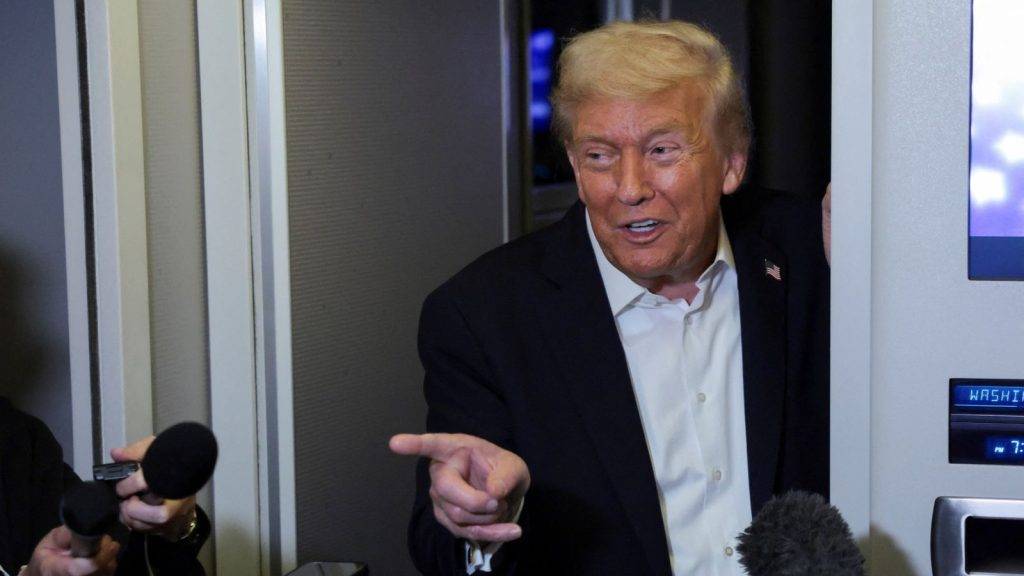Cliff Notes
- Donald Trump declared a “historic day” following a peace deal in Egypt, aimed at rebuilding Gaza after securing a ceasefire and the return of all living Israeli hostages.
- The agreement involves a proposed “board of peace” to oversee a transitional authority, with Trump potentially chairing this initiative.
- World leaders in attendance included Egyptian President el-Sissi and Turkish President Erdogan, while the UK expressed a willingness to monitor the ceasefire and decommission Hamas’s capabilities.
Trump wants to ‘rebuild Gaza’ after signing ‘historic’ peace deal | World News
.
Donald Trump has hailed a “historic day” which he hopes will lead to “rebuilding Gaza” after a peace deal was signed at a global summit in Egypt.
The US president spoke to reporters aboard Air Force One on his way back from Sharm el-Sheikh, where world leaders gathered on Monday to mark an agreement he said had answered the “prayers of millions”.
Gaza deal signed – as it happened
Asked whether the deal, which has secured a ceasefire in Gaza and seen all living Israeli hostages returned to their families, could lead to a Palestinian state, Mr Trump said: “We’re talking about rebuilding Gaza.
“I’m not talking about single state or double state or two-state. We’re talking about the rebuilding of Gaza.”
Mr Trump’s longer-term 20-point proposal includes a “board of peace” to oversee the creation of a transitional authority for the territory. It would be chaired by Mr Trump, who has floated a role for Sir Tony Blair. He was also in Egypt, along with his successor Sir Keir Starmer.
Speaking to those assembled in Sharm el-Sheikh, Mr Trump said: “We’ve achieved what everybody said was impossible, at long last, we have peace in the Middle East.”
Mr Trump, Egyptian President Abdel Fattah el-Sissi, Turkey’s Recep Tayyip Erdogan and Qatari Emir Tamim bin Hamad Al Thani had earlier signed a document he said would lay the groundwork for Gaza’s future.
However, a copy was not made public.
Mr Trump had flown to Sharm el-Sheikh from Jerusalem, where he got a rapturous welcome and at least 22 standing ovations as he addressed Israel’s Knesset (parliament) – but was also heckled by some members.
The US president, who was hailed by Israeli Prime Minister Benjamin Netanyahu as Israel’s “greatest friend”, said “after so many years of unceasing war and endless danger, today the skies are calm, the guns are silent and the sirens are still”.
He added: “It’s the start of a grand concord and lasting harmony for Israel and all the nations of what will soon be a truly magnificent region.”
It comes after Israel and Hamas last week agreed to the first phase of a long-sought ceasefire deal aimed at bringing the devastating war in Gaza to an end after two years of bloodshed.
Israel’s war in Gaza, launched following the killing of 1,200 people and capture of 251 more by Hamas during its attacks on 7 October 2023, saw more than 67,000 Gazans killed, according to Palestinian health officials.
Its figures do not differentiate between civilians and combatants, but it says around half of those killed were women and children.
On Monday, Hamas freed all 20 living hostages, but only released the bodies of four dead hostages.
As part of Mr Trump’s peace deal, Hamas was given 72 hours (until 10am on Monday) to return the 48 hostages left in Gaza – 20 of whom were known to be alive and 28 who have died.
Hamas previously indicated that recovering the bodies of some dead hostages may take longer, as not all burial sites are known.
The Hostages and Missing Families Forum condemned Hamas’s actions, calling it “a blatant breach of the agreement”.
Prime Minister Sir Keir Starmer attended the ceremony in Sharm el-Sheikh alongside other world leaders, including Italy’s Giorgia Meloni and France’s Emmanuel Macron.
He said the UK could play a key role in monitoring the ceasefire.
Sir Keir said: “What happens tomorrow really matters, and that’s why, what I’ve been discussing with leaders all day is, what part can we play?
“And we, the United Kingdom in particular, I think, can play a part in monitoring the ceasefire, but also decommissioning the capability of Hamas and their weaponry drawing on our experience in Northern Ireland.
“So the question today has already moved to, how do we implement how do we make sure this moves forward? It’s really important we keep that focus. We mustn’t have any missteps now.”


